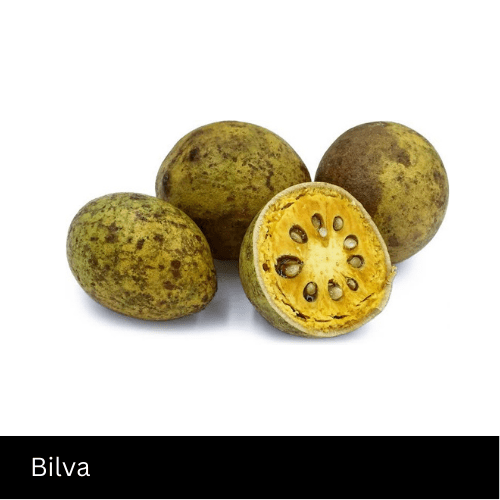The fruit of the Aegle marmelos tree is a hard-shelled, woody fruit that is about the size of a large grapefruit. The pulp of the fruit is used in traditional medicine to treat a variety of ailments, including diarrhea, dysentery, and respiratory infections. The fruit is also used to make a popular drink in India known as bael sharbat.
The leaves, bark, and roots of the Aegle marmelos tree also have medicinal properties and are used in various Ayurvedic remedies. The leaves are used to treat digestive disorders and skin diseases, while the bark and roots are used to treat fever and malaria.
In addition to its medicinal properties, the Aegle marmelos tree is also valued for its wood, which is used in construction and furniture making, and for its fragrant flowers, which are used in perfumes and aromatherapy.
Other Names of Aegle Marmelos / Bilva
- Bengal quince
- Stone apple
- Wood apple
- Bel
- Sirphal
- Shivadruma
- Vilvam
- Koovalam
- Maredu
- Bael patra (leaves)
These names may vary based on the geographical location and cultural context.
10 Benefits of Aegle Marmelos / Bilva
Aegle marmelos or Bilva is known for its many health benefits. Here are ten potential benefits of Aegle marmelos:
-
Digestive health: The pulp of the Bilva fruit is rich in fiber and has been traditionally used to treat digestive disorders like diarrhea, dysentery, and constipation.
-
Respiratory health: Bilva leaves and fruit pulp are believed to have anti-inflammatory and antimicrobial properties that can help to treat respiratory infections like asthma, bronchitis, and coughs.
-
Immunity: The Vitamin C content in Bilva helps to boost immunity and protects against infections and diseases.
-
Skin health: Bilva is believed to have antimicrobial and anti-inflammatory properties that may help to improve skin health and treat skin infections and disorders.
-
Blood sugar control: Bilva leaves and fruit pulp are believed to have a hypoglycemic effect, which may help to regulate blood sugar levels in people with diabetes.
-
Heart health: Bilva is believed to have cardioprotective properties that may help to reduce the risk of heart diseases by reducing cholesterol levels and preventing the oxidation of LDL cholesterol.
-
Anti-inflammatory: Bilva is believed to have anti-inflammatory properties that may help to reduce inflammation and pain in conditions like arthritis and other inflammatory disorders.
-
Anti-cancer: Bilva leaves and fruit are believed to have anticancer properties that may help to prevent the growth and spread of cancer cells.
-
Stress relief: The leaves of Bilva are believed to have a calming effect on the nervous system, reducing stress and anxiety.
-
Antioxidant: Bilva is rich in antioxidants like Vitamin C, flavonoids, and carotenoids, which may help to protect against oxidative damage and reduce the risk of chronic diseases.
-
Bael Patra Bilva – This variety is known for its medicinal properties and is commonly used in Ayurvedic medicine.
-
Lakshmi Bilva – This variety is believed to be auspicious and is used in religious rituals.
-
Swarnapatri Bilva – This variety has golden-colored leaves and is believed to have spiritual significance.
-
Tantu Bilva – This variety is used for its wood, which is strong and durable and is used in construction and furniture making.
-
Madhuca Bilva – This variety is known for its sweet fruit, which is used to make jams and jellies.
The type of Aegle marmelos or Bilva can depend on the region, climate, and soil conditions. The most common variety used for medicinal purposes is the Bael Patra Bilva.
-
Alkaloids: Bilva contains several alkaloids, including marmelosin, skimmianine, and boldine. These alkaloids are believed to have various medicinal properties, including antimicrobial and anti-inflammatory effects.
-
Flavonoids: Bilva contains several flavonoids, including quercetin and kaempferol. Flavonoids are known for their antioxidant and anti-inflammatory properties.
-
Tannins: Bilva contains tannins, which are responsible for the astringent taste of the fruit. Tannins have antioxidant and anti-inflammatory properties and are also believed to have antidiarrheal effects.
-
Essential oils: Bilva leaves and fruits contain essential oils that contribute to their distinct aroma and flavor. These oils are also believed to have antimicrobial and anti-inflammatory properties.
-
Vitamins and minerals: Bilva fruit is a rich source of vitamins and minerals, including vitamin C, vitamin B, potassium, calcium, and magnesium.
These are just a few of the many chemical compounds found in Aegle marmelos or Bilva.

